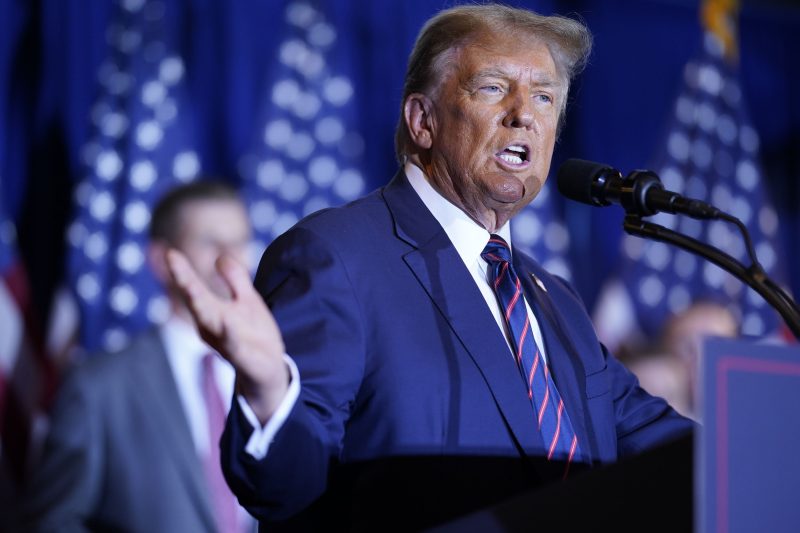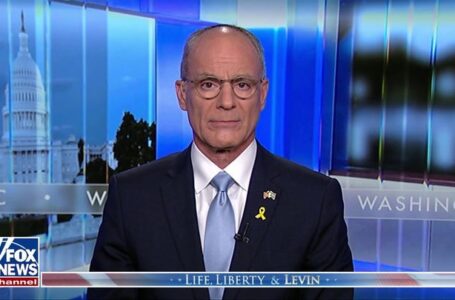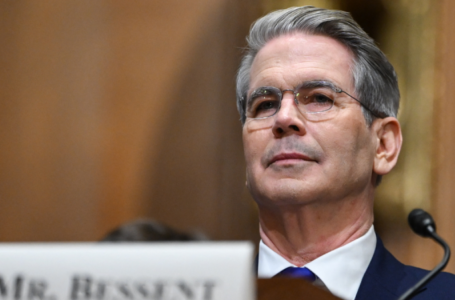Hamas says it is willing to release US-Israeli hostage and bodies of four dual nationals
Trump spent more than $55 million in donor money on legal fees last year, filings show


Former president Donald Trump is cruising toward the Republican presidential nomination after victories in Iowa and New Hampshire, but he is diverting enormous sums of donor money to his mounting legal fees as he faces multiple lawsuits and 91 felony charges across four criminal cases.
The new figures for his legal spending were outlined in campaign disclosures filed with the Federal Election Commission on Wednesday night. Trump’s advisers have said the money that is being spent on legal expenses is not only for Trump’s defense, but also for the lawyer fees for some of his advisers and associates. Here are a few early takeaways from the new filings:
Two of Trump’s committees, Save America leadership PAC and the Make America Great Again PAC, spent $55.6 million on legal bills in 2023, including $29.9 million in the second half of the year, according to the new reports released Wednesday.
The Trump campaign had more than $33 million in cash on hand at the end of last year after raising more than $19 million in the fourth quarter. Save America leadership PAC had about $5.1 million in cash on hand at the end of the year. Across all of his committees, Trump had a war chest of over $70 million at the end of the year, a total that includes cash available to his allied super PAC, MAGA Inc.
Trump has raised most of his campaign funds from small-dollar donors. In the fine print of his solicitations, Trump’s joint fundraising committee notes that about 90 cents of each dollar is diverted to his campaign committee and 10 cents is diverted to the Save America leadership PAC.
Save America, a political action committee that the former president formed as he raised money from his donors while falsely claiming that the 2020 election was fraudulent, has served as his main vehicle to pay legal bills. Trump’s advisers have said that he is helping to pay lawyers’ fees for dozens of people to prevent their “financial ruin,” as he argues that he is the victim of a “weaponized” justice system. Small amounts of the legal payments could be directed for Trump’s reelection campaign or for routine legal expenditures incurred for operational purposes, but usually that’s a small percent of total expenditures.
The legal spending peaked in July, when special counsel Jack Smith issued a superseding indictment in the Mar-a-Lago classified documents case, and immediately before Trump’s indictment on Aug. 1 in a Georgia election interference case. Trump-supporting PACs paid $6.6 million to dozens of legal firms that month.
The Save America account had about $100 million at the beginning of 2022. When the funds in the Save America account were nearly depleted last year, operatives for Trump began transferring money among his different committees, including some that were left over from his 2020 presidential campaign. One of those committees is the Make America Great Again PAC. That committee received a total of $11.8 million from Save America in multiple transfers across 2023 and has spent the sum almost entirely on legal fees.
At the outset of his 2024 presidential campaign, Trump transferred $60 million to the main super PAC associated with his reelection effort, MAGA Inc. As a super PAC, the committee can raise unlimited sums to spend on advertising and other efforts to support Trump’s candidacy. But some of that money has since been transferred back to Save America in an apparent effort to ease its cash crunch as his legal bills grow. As of Wednesday’s filing, $42.5 million had been refunded from MAGA Inc. to Save America.
The Patriot Legal Defense Fund, a fund focusing on paying for lawyers for Trump associates, submitted a new filing with the Internal Revenue Service that showed $221,000 in payments to Brand Woodward Law in December. The firm has represented Trump associates including Waltine “Walt” Nauta and Dan Scavino. The fund also paid law firm Gibson Dunn and Crutcher $150,000 for “services rendered.” A filing in December showed that the fund spent $18,136 to host a banquet at Mar-a-Lago, Trump’s Florida residence and private club.
Florida Gov. Ron DeSantis and his allied committees were initially a fundraising juggernaut that posed a serious threat to the Trump campaign. But as his candidacy faded last fall in the midst of a messy power struggle within his orbit, his rival former U.N. ambassador Nikki Haley got a fresh look from donors who had previously given to DeSantis and some donors who had stayed on the sidelines.
The FEC reports filed on Wednesday from the campaign illustrate how difficult it might have been for him to carry on if he had not dropped out after the Iowa caucuses.
Never Back Down, the super PAC funding much of DeSantis’s operation, took in $14.5 million in the second half of 2023 — far less than officials had hoped for after amassing some $130 million in the first half of the year. In August, super PAC’s officials asked donors to help them raise $50 million more by the end of 2023 and another $50 million by March.
Never Back Down spent more than $130 million throughout 2023, ending the year with less than $15 million in cash on hand. About $10 million was transferred late in the race to a new super PAC; the DeSantis campaign began to route donors there instead.
Meanwhile, DeSantis’s campaign — which unlike a super PAC is subject to contribution limits — brought in about $6.7 million in the fourth quarter and spent $9.3 million. It ended the year with close to $10 million cash on hand — but much of that was not available for the primary fight that he had hoped to wage against Trump and Haley.
DeSantis continued to fly private even as his operation tried to save money, leaning on Never Back Down to underwrite some of his travel. For a time, the super PAC and the campaign both paid a company called N2024D to cover some private plane costs. In the fall, another transportation company began to receive travel payments from both the campaign and Never Back Down. The DeSantis campaign paid more than a half-million dollars to TMFB, a Florida-based company formed last June, with documents naming Craig Mateer, a DeSantis appointee; the super PAC paid TMFB more than a quarter million.
In the second half of 2023, as Haley was surging in national polls and the key early state of New Hampshire, her campaign and the allied super PAC known as SFA Fund Inc. received a major infusion of cash from deep-pocketed donors.
Her campaign raised more than $17 million in the fourth quarter and had $14.1 million in cash on hand at the end of the year.
Her backers included some of the biggest megadonors to the GOP, including billionaire hedge-fund manager Paul Singer and Citadel CEO Ken Griffin, who both donated $5 million to SFA Inc. in the fourth quarter. As she touted her strong support for Israel, Haley also drew major support from some of the most prominent Jewish donors in the country, including Jan Koum, the WhatsApp founder who gave $5 million to the Haley super PAC last year. Other major donors to her effort included insurance executive Pat Ryan and philanthropist Shirley Ryan, who gave a total of $5 million to the super PAC; Arkansas-based investment banker Warren Stephens, who gave more than $2 million; and California-based investor Timothy Draper, who donated $1 million, according to the fourth-quarter reports.
SFA Fund showed a notable burn rate between July and December of last year, spending $63.7 million and ending the year with about $3.5 million in cash on hand. The group’s advisers have said they are raising money at a fast clip this year and will be able to help Haley compete through the coming contests.
The Biden For President committee raised $33 million in the third quarter and ended the year with $45.9 million in cash on hand, besting the Trump campaign. Unlike Trump, President Biden has not been forced to spend down his campaign cash in a competitive primary, as he has faced only nominal opposition from candidates such as Rep. Dean Phillips (D-Minn.) and author Marianne Williamson.
Both Biden and Trump are raising money through their joint fundraising committees. The Biden Victory Fund reported more than $69 million in contributions. The Trump Save America joint fundraising committee raised more than $75 million total.
The Biden Action Fund — a joint effort between the Biden campaign, the Democratic National Committee and state committees — raised over $5 million in the second half of the year. Together, Biden’s committees and the DNC ended the year with a war chest of $117 million. (The Biden Action Fund had $11 million in cash on hand at the end of the year, while the Biden Victory Fund had $37.5 million left over.)
While Democrats are optimistic about their general-election prospects based on their current cash-on-hand advantage, Trump will have the opportunity to tap into a new pool of donations if and when he signs certain fundraising agreements with the Republican National Committee and state committees. TJ Ducklo, senior adviser for communications on the Biden campaign, argued in a statement late Wednesday that while Trump “lights money on fire” paying his expenses, the Biden-Harris campaign “is hard at work talking to the voters who will decide this election and building the campaign infrastructure to win in November.”
The Trump team did not immediately respond to a request for comment on their filings.
The Republican National Committee reported a bleak financial picture at the end of December compared with the Democratic National Committee, reporting $8 million in cash on hand to the DNC’s $21 million in cash.











